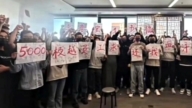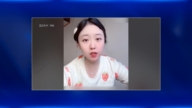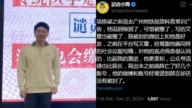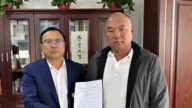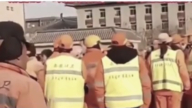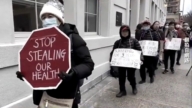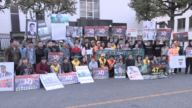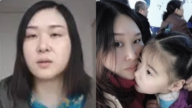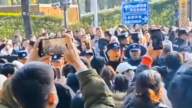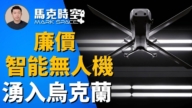【新唐人2014年05月14日訊】工會,又被稱作「工人聯合會」,原本是為了維護工人權益而建立。但是在中國大陸,官辦工會卻被勞動者們稱為「紙上工會」,大多數勞工在權益受損時,寧可選擇罷工,也不願求助工會。直到一名女工將大陸唯一的官辦工會——中華總工會,以「不作為」的理由告上了法庭,才引發各界對工會制度名存實亡的思考。
近年來,隨著大陸工人對自身權益的了解不斷增加,維權意識也日益高漲,致使越來越多的地區爆發罷工和工人運動事件。據勞工權益組織——「中國勞工通訊」公布的數據顯示,今年年初以來,大陸出現的罷工數量比去年同期多出三分之一。
令外界關注的是,大陸幾乎所有群體性工人罷工事件,都繞開工會進行。原本應該負責在企業與員工間進行溝通,幫助工人向企業爭取合法權益的工會組織,在勞資雙方發生糾紛時,卻鮮少介入。
大陸「大學師生監察無良企業行動」幹事梁佩筠:「因為現在這麼多的罷工,我們就會看到其實工人也有一個意識,就是他們的權益受危害的時候,他們也知道他們要站出來。但是可能中間沒有一個暢通的渠道,讓勞資雙方來做一個協調或者溝通。」
大陸勞工們不禁質問,擁有近3億成員,每年會費收入數百億的官辦工會——「中華全國總工會」的存在,究竟有甚麼意義?
去年7月23號,被美國跨國零售企業「沃爾瑪」開除的大陸女員工王亞芳,將深圳的「中華全國總工會」分支機構告上法庭。理由是在她被解聘過程中,工會沒有盡到應盡的義務,導致她名譽受損。
據報導,2011年,深圳一家「沃爾瑪」商場以「不誠信」的理由,解僱了工作9年的女收銀員王亞芳。而單位工會在王亞芳求助時,不但拒絕幫忙,而且對「沃爾瑪」解聘她的決定沒有做出任何異議,不經調查就立刻蓋章確認,導致她的名譽權受到損害。
代理這一案件的律師何遠程在接受美國《紐約時報》等外媒採訪時表示,「中華全國總工會」在保護勞工權益和利益方面嚴重失職,這項指控得到了許多中國勞工支持。他們希望藉助這個案件對中國的工會體制進行「敲打」,希望工會能夠真正代表員工的利益。
梁佩筠:「我們也是希望在企業的層面來說,按照中國《工會法》,可以允許中國工人來選出他們自己工會的代表。」
有分析指出,雖然中國大陸地區有著大量的工會組織,但勞動者們普遍認為這些工會早已名存實亡,淪為「紙上工會」。實際上中國真正的工會只有一個,就是「中華全國總工會」,各個城市的總工會以及企業的工會,其實都是「中華全國總工會」的分支機構,而且全部在共產黨領導之下,工會的首要職責是與政府保持一致。
深圳「春風勞動爭議服務部」負責人張治儒:「中國目前的官方工會,可能是因為體制的原因,導致它沒有甚麼作為。其實我們應該知道,作為一個工會組織,應該是獨立的,不應該成為一個政府的附庸。」
大多數國家的工會是由工人本身成立,而中國的工會已經成為企業內部的一個組織部門,工會的人事任免往往由企業管理層決定,而不是由員工選出。國有企業的工會成員甚至直接由政府部門任命。這樣一來,當勞方和資方發生糾紛時,工會代表的往往是資方的利益,而不是工人的權益。
張治儒:「他們(工人)權益被侵犯,是因為他們確實沒有自己的維權組織、沒有自己的代表。但是因為他們在中國這個政策之下成立了工會,必須受官方工會的領導。所以說,就是成立了工會組織也很難發揮作用。因為官方工會是你領導、是你的上級機關,一個它不會支持你去維護工人的利益、權利。第二個,它也可能會阻止你去維權,其實官方工會不只沒有起到給工人維權的作用,反而起到對工人維權不利的一些作用。」
對於外界普遍指稱的,中國只有「紙上工會」一說,大陸勞動者的回答是:不敢替勞動者維權的工會要來何用?
採訪編輯/張天宇 後製/舒燦
What is the purpose of “paper unions" in China?
Unions, also known as “Workers Unions" were originally
established in order to protect the interests of workers. But in
China, the government-run workers unions have been called
“paper unions". When most workers’ interests are damaged,
they would prefer to strike, instead of seeking help from the
union. Recently a worker in the mainland sued the government-
run unions – China Federation of Trade Unions giving “doing
nothing" as a plea to the court. This case leads all walks of life to
think of trade unionism in China – as in name only.
In recent years, with increasing awareness of mainland
workers about their rights, more and more strikes and workers’
movements break out in different areas. According to labor
rights organizations – “China Labour Bulletin" released at
the beginning of this year, the number of strikes grew by one-third
more than last year.
To the concern of the outside world, almost all groups of workers
strikes in the mainland bypass the unions that are supposed to
be responsible for communication between enterprises and
employees, to help workers get their legitimate rights. However,
they rarely get involved in labor disputes between the two sides.
Liang Peijun, the administrative secretary of the “Students and
Scholars Against Corporate Misbehavior" said: “There are so
many strikes now, we will see the workers actually have a sense
of protecting their interests. They know that they should stand
up when their interests are compromised. However, there is no
smooth channel in the middle to allow employers and employees
to coordinate or communicate."
Mainland workers will ask what is the significance of the
“ACFTU". There are nearly 300 million members and its
annual income reaches tens of billions.
On July 23 last year, Wang Yafang, a female employee who
was dismissed from Wal-Mart – the U.S. multinational retail
company, sued the “ACFTU" branch in Shenzhen in the court.
The reason was in the process of her dismissal, the union did not
fulfill its obligations. Therefore, her reputation was lost.
According to reports, in 2011, a Wal-Mart shopping mall in
Shenzhen dismissed Wang Yafang by reason of “bad faith".
Wang Yafang was a female cashier and had worked there for 9 years.
Wang tried to get help from the union but the union refused to help.
The union did not make any objection to the dismissal decision
and rubber-stamped it immediately without any investigation. Wang’s
reputation was damaged after that.
He Chengyuan, the lawyer in the case said to New York Times
that there are serious derelictions of duty by the ACFTU, specially
in the protection of labor rights and interests. This allegation was
supported by many Chinese workers. They want to take up this case
to “beat" the Chinese trade union system. I hope the union can
truly represent the interests of employees.
Liang Peijun: “We also hope that the enterprise will allow
Chinese workers to elect representatives of their own union,
according to ‘Trade Union Law’."
Some analysts pointed out that although mainland China has a
large number of trade unions, workers generally agreed that
these unions have long existed in name only. They are the
“paper trade unions". In fact, the only one union is ACFTU. The
labor unions in various cities are ACFTU branches. They are all
under the leadership of the CCP. The primary responsibility of
trade unions is to be consistent with the government.
Zhang Zhiru, the leader of “Spring Labor Dispute Service" in
Shenzhen said: “The official trade union in China does nothing,
probably because of institutional reasons. In fact, we should
know that as a trade union organization, it should be independent,
instead of a vassal of the government."
Unions in most countries were established by the workers
themselves. In China, it has become a trade union sector within
the enterprises. Appointment and removal issues are often
decided by the corporate management, rather than by the election of
employees. In the state-owned enterprises, the union members
are even directly appointed by the government. As a result, when
there is a dispute between employers and employees, the union
representatives will pay attention to the interests of employers,
rather than the interests of workers.
Zhang Zhiru: “Their (the workers) rights have been violated,
because they do not have their rights organization and
representatives. However, according to the policy in China, the
union they established must be under the leadership of the
official trade unions. Therefore, the unions could hardly play a
role. The official trade union is your leader, your superior
authority. First, it will not support your interests and rights.
Second, it may prevent you from protecting your rights. In fact, the
official union does not play any role in protecting the workers’ interests,
but produces an adverse effect on workers rights."
It is so widely alleged that there are only “paper unions" in China,
mainland workers’ question: “What is the purpose of
these ‘doing nothing’ unions?"
Interview & Edit/Zhang Tianyu Post-Production/Shu Can


